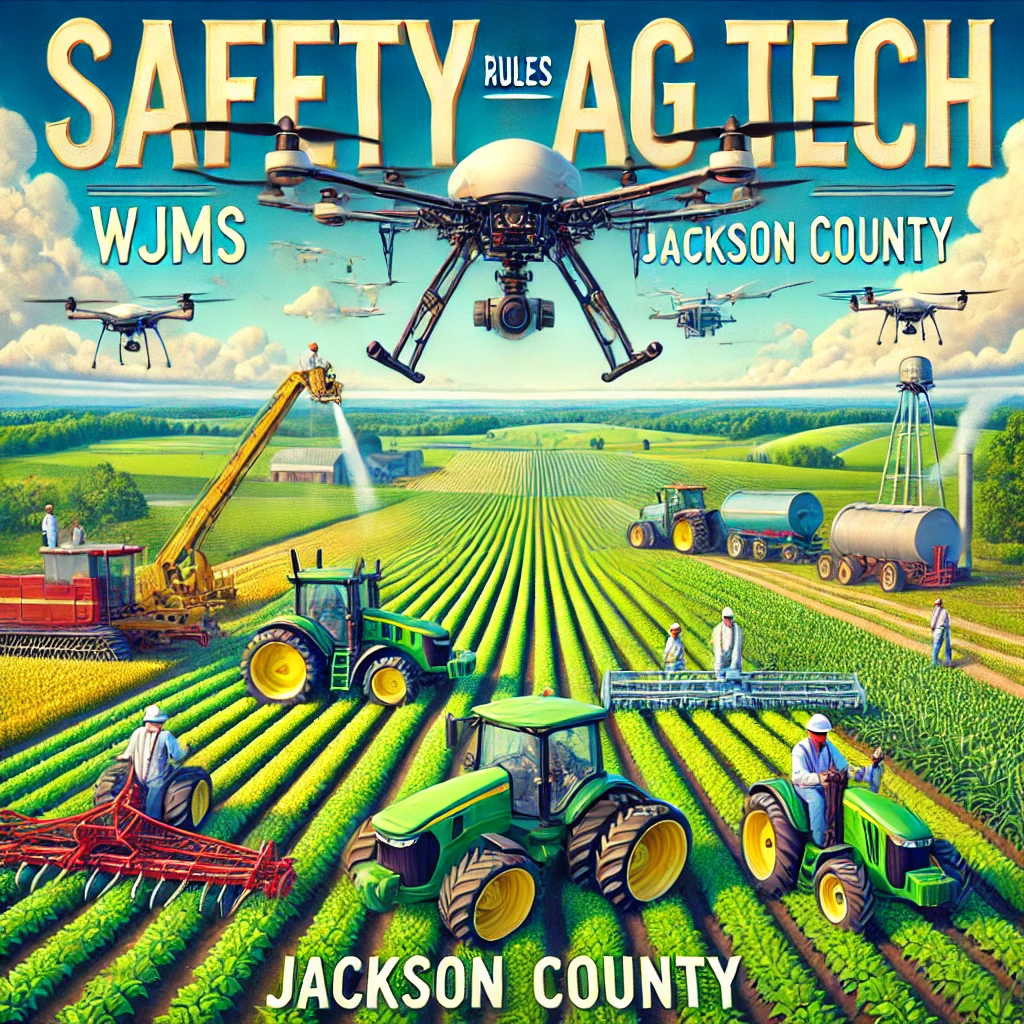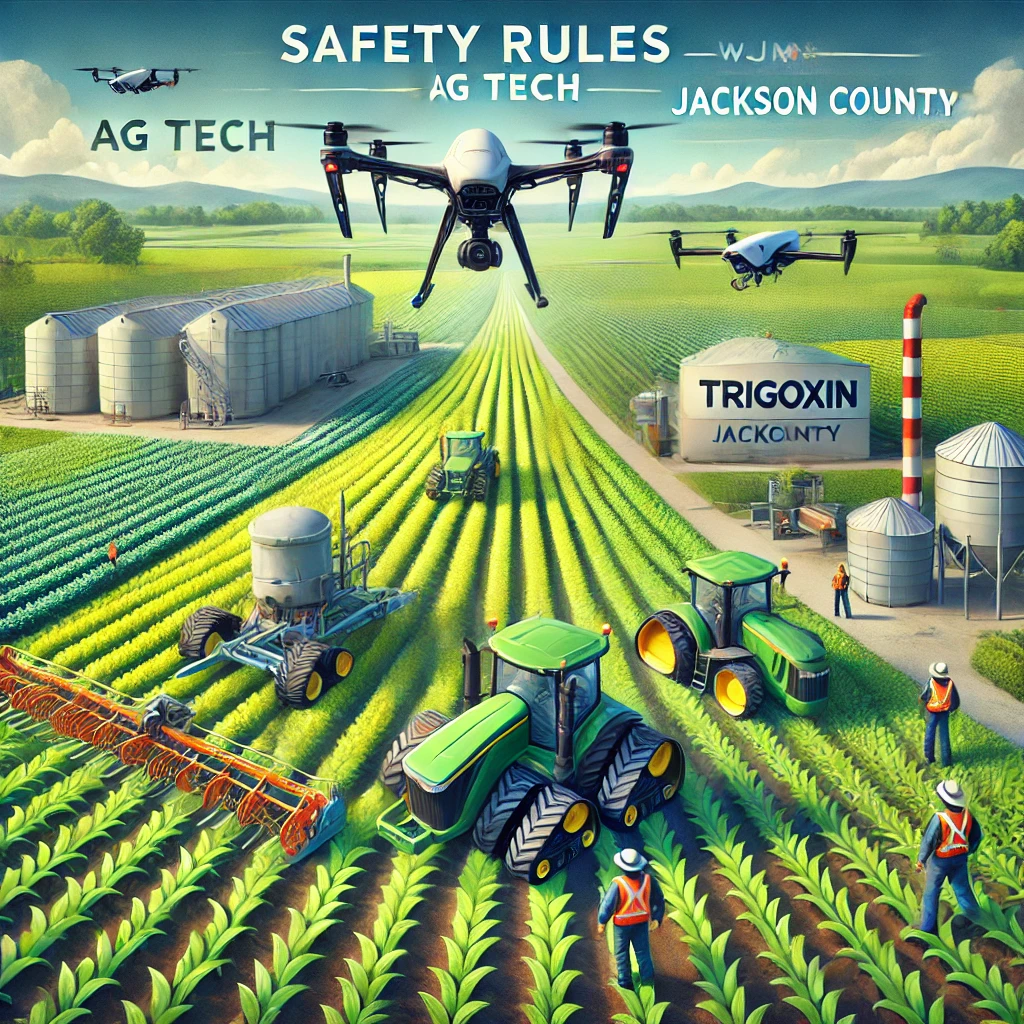Safety Rules Ag Tech WJMS Jackson County: A Comprehensive Guide
In the modern agricultural landscape, technology has become a cornerstone of productivity and sustainability. With innovations ranging from autonomous machinery to data-driven solutions, the agricultural sector has embraced a new era of efficiency and precision. However, with great advancements come greater responsibilities, especially when it comes to safety. For the farmers, workers, and stakeholders in Jackson County, adhering to safety rules ag tech WJMS Jackson County is essential to ensure the well-being of individuals and the success of operations.

This article will delve into the critical importance of these safety rules, provide actionable guidelines, and explore how WJMS Jackson County is leading the way in implementing for agricultural technology.
The Evolution of Ag Tech in Jackson County
Ag tech, or agricultural technology, refers to the tools, machinery, and software used to enhance farming practices. In Jackson County, the adoption of ag tech has revolutionized farming. Farmers now use precision GPS systems for planting, drones for crop monitoring, automated irrigation systems, and even AI-based analytics to predict crop yields. These innovations save time, reduce waste, and increase profitability.
However, the integration of also presents challenges, especially in terms of safety. That’s why safety rules ag tech WJMS Jackson County are vital for protecting both workers and the environment.

Why Safety Rules Are Crucial in Ag Tech
The need for safety in agriculture is not new, but the introduction of technology has added new dimensions to this requirement. Unlike traditional farming tools, ag tech devices are often more complex, involving electricity, chemicals, and heavy machinery. Failure to follow safety rules ag tech WJMS Jackson County can lead to:
- Injuries caused by machinery malfunctions.
- Health issues due to chemical exposure.
- Financial losses from equipment damage or downtime.
- Environmental harm from improper technology use.
By understanding and implementing these safety rules, farmers in Jackson County can ensure that ag tech is a force for progress rather than a source of risk.

Key Safety Rules Ag Tech WJMS Jackson County
- Training Is Non-Negotiable
Proper training is the foundation of safety in ag tech. Every operator, whether handling drones or automated harvesters, must be thoroughly trained in how to use the equipment safely. - Regular Equipment Maintenance
Machines need regular checks to ensure they function correctly. One of the essential safety rules ag tech WJMS Jackson County promotes is routine inspection and timely maintenance of all equipment. - Proper Use of Personal Protective Equipment (PPE)
Workers should always wear the appropriate PPE, such as gloves, goggles, and helmets, especially when handling chemicals or operating machinery. - Clear Communication and Protocols
Miscommunication can lead to accidents. Establishing clear protocols and using tools like radios or mobile apps for communication is crucial. - Emergency Preparedness
Every farm in Jackson County should have an emergency response plan in place. Workers must be trained in first aid and know how to react during equipment failures, chemical spills, or extreme weather events. - Compliance with Regulations
Adhering to local and federal regulations is a key aspect of safety rules ag tech WJMS Jackson County. This includes proper handling and storage of chemicals, waste management, and environmental protection measures.
Addressing Common Hazards in Ag Tech
1. Machinery Risks
Modern machinery such as GPS-guided tractors and automated harvesters is incredibly efficient but can be dangerous if misused. To minimize risks:
- Always shut off machines before maintenance.
- Ensure safety guards are in place.
- Never bypass built-in safety features.
2. Chemical Exposure
Ag tech often involves the application of fertilizers, pesticides, and other chemicals. Following these safety rules ag tech WJMS Jackson County will reduce exposure:
- Calibrate machinery for precise application.
- Wear protective gear when handling chemicals.
- Store chemicals in designated, secure areas.
3. Electrical Hazards
Ag tech relies heavily on electrical systems. To avoid accidents:
- Regularly inspect electrical equipment for damage.
- Keep water sources away from electrical systems.
- Train workers to handle electrical emergencies.
4. Environmental Factors
Weather conditions can significantly impact the safe use of ag tech. For example:
- Avoid using drones or sensors in high winds or storms.
- Protect sensitive equipment from extreme temperatures.
- Monitor weather forecasts before planning operations.
How WJMS Jackson County Supports Safety in Ag Tech
WJMS Jackson County has made it a priority to educate farmers about the importance of safety in agriculture. Through workshops, training sessions, and regular inspections, the county ensures that farms are equipped to handle the challenges of modern technology.
Community Workshops
Farmers and workers can attend workshops focusing on safety rules ag tech WJMS Jackson County. These events cover topics like machinery operation, chemical handling, and emergency planning.
Technology Safety Certifications
WJMS Jackson County encourages workers to obtain certifications that demonstrate their understanding of safety protocols. These certifications not only enhance worker confidence but also improve overall farm safety.
Collaborative Efforts
Farmers in Jackson County often collaborate to share best practices for adhering to safety rules ag tech WJMS Jackson County. This sense of community fosters innovation and accountability.
The Future of Safety Rules Ag Tech WJMS Jackson County
As technology continues to evolve, so will the safety measures required to manage it effectively. The future of safety rules ag tech WJMS Jackson County will likely focus on:
- Robotics: With the rise of robotic harvesters, new safety guidelines will address the risks of human-machine interaction.
- Sustainability: Emphasis will be placed on eco-friendly practices that align with safety standards.
- Data Security: Protecting farm data from cyber threats will become a crucial aspect of safety.
By staying ahead of these trends, Jackson County will continue to lead in both innovation and safety.
Final Thoughts
The adoption of ag tech has brought immense benefits to the agricultural sector, but it has also highlighted the importance of safety. For farmers in Jackson County, following safety rules ag tech WJMS Jackson County is not just about compliance; it’s about protecting lives, improving efficiency, and preserving the environment.
Through proper training, regular equipment maintenance, and a commitment to best practices, the community can embrace the future of farming with confidence. As the industry evolves, the focus on safety will ensure that technology continues to enhance, rather than hinder, agricultural progress.
Let us work together to prioritize safety and make WJMS Jackson County a model for innovation and responsibility in ag tech.
FAQs: Safety Rules Ag Tech WJMS Jackson County
1. What are safety rules in ag tech, and why are they important?
Safety rules in ag tech refer to the guidelines and protocols designed to protect farmers, workers, equipment, and the environment when using advanced agricultural technology. These rules are important to minimize risks such as injuries, equipment damage, chemical exposure, and environmental harm while maximizing efficiency and productivity.
2. What types of ag tech are commonly used in Jackson County?
In WJMS Jackson County, farmers frequently use:
- GPS-guided tractors for precision farming.
- Drones for crop monitoring and pest control.
- Automated irrigation systems.
- AI-based software for predictive analytics and resource management.
3. Who is responsible for ensuring compliance with safety rules ag tech WJMS Jackson County?
Farm owners, managers, and workers share responsibility for implementing and following safety rules. Additionally, local authorities and agricultural organizations in Jackson County provide training and resources to help farms stay compliant.
4. What are the most critical safety practices in ag tech?
Key safety practices include:
- Comprehensive training for all operators.
- Regular maintenance and inspection of equipment.
- Use of personal protective equipment (PPE).
- Establishing clear communication and emergency protocols.
- Adhering to local and federal safety regulations.
5. How can farmers in Jackson County stay informed about safety rules?
Farmers can attend workshops, participate in community training sessions, and consult resources provided by local agricultural organizations and government agencies. WJMS Jackson County also offers regular safety audits and updates on new regulations.
6. What are common hazards associated with ag tech?
Some common hazards include:
- Machinery malfunctions or improper use.
- Chemical exposure from fertilizers and pesticides.
- Electrical hazards from tech-powered systems.
- Environmental challenges such as extreme weather affecting equipment.
7. What role does WJMS Jackson County play in promoting safety?
WJMS Jackson County leads efforts to educate farmers and workers on safety rules, conducts regular inspections, and fosters collaboration among the agricultural community. Their initiatives include technology safety certifications, training programs, and safety awareness campaigns.
8. How often should equipment be inspected or maintained?
Farm machinery and tech systems should be inspected and maintained regularly, based on manufacturer recommendations or after every significant use. Preventative maintenance reduces the risk of malfunctions and extends the lifespan of equipment.
9. What emergency plans should farms have in place?
Farms should develop plans for:
- Equipment failures or accidents.
- Chemical spills and exposure incidents.
- Natural disasters like storms or fires.
Training workers on first aid and emergency protocols is also essential.
10. How will safety rules evolve as ag tech advances?
Future safety rules will likely address:
- Increased use of robotics and automated machinery.
- Cybersecurity for protecting farm data.
- Sustainable and eco-friendly tech integration.
Staying updated on these changes will be critical for farms in Jackson County.
11. Are certifications necessary for operating advanced ag tech?
While not always required, certifications demonstrate a worker’s knowledge and competence in handling ag tech safely. WJMS Jackson County encourages certifications as they enhance farm safety and worker confidence.
12. How can I get more information about safety rules ag tech WJMS Jackson County?
You can contact local agricultural organizations, attend WJMS Jackson County safety workshops, or visit the county’s official agricultural safety website for comprehensive resources and updates.
These FAQs aim to provide clear, actionable information, helping farmers and workers prioritize safety while leveraging the full potential of ag tech in WJMS Jackson County.

